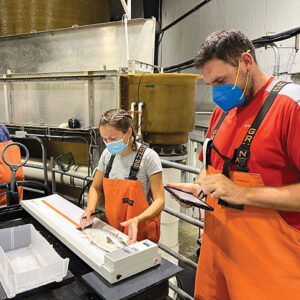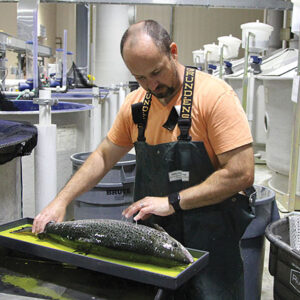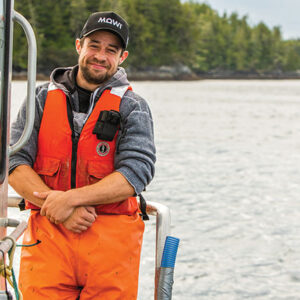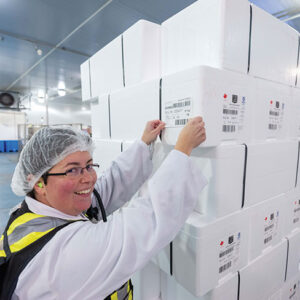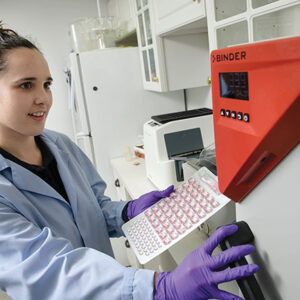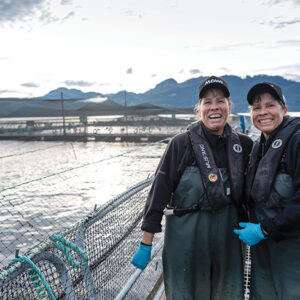
The world of work
May 17, 2023
By
Mari-Len De Guzman
Strategies for training, retaining a new generation of aquaculture workers
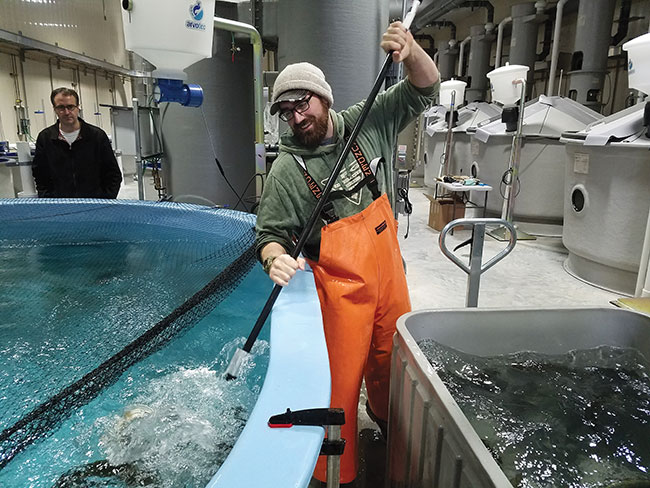
Quiet quitting or quiet hiring trends notwithstanding, the opportunities for employment and professional growth in aquaculture are loud and clear.
Workplaces are increasingly becoming more creative and impactful with their hiring and retention strategies, from pushing hybrid work and competitive workplace wellness programs to driving diversity, equity and inclusion and innovations.
And while other industries may be a bit more challenged in hiring for specific skills – and keeping those new hires engaged – aquaculture organizations, particularly seafood producers, can offer plenty of unique opportunities and environments for professionals across multiple disciplines.
“There’s a lot of excitement around aquaculture because it hits on all those different disciplines,” said David Kuhn, associate professor in the department of food science and technology at Virginia Tech, Blacksburg, VA. “It’s attractive to the people who are interested in biology or engineering, or the chemistry or the food science side of things, or the economics or sustainability (side). And so it’s one of those things that really gets people excited to get into it.”
Although Virginia Tech does not have an aquaculture program, Kuhn’s students in the department of food science and technology conduct aquaculture-related research that cuts across multiple areas of study.
This diversity in the education realm may be reflective of the realities of the workplace in the aquaculture sector, particularly in seafood farming, where the roles are as diverse as the species produced.
“There seems to be a place for everybody, really,” said Jamie Gaskill, CEO of Poseidon Ocean Systems, which provides integrated fish life support systems for the aquaculture industry, based in Campbell River, B.C.
“Granted, more technology has come out, and the people that are in existing roles in salmon farming tend to be very innovative themselves, and even if they weren’t trained in that particular technology, they’re normally very good at picking it up.”
Learning the skills
Gaskill has been a salmon farmer for more than 30 years, 18 of which were spent working at Mowi (formerly Marine Harvest Group) at the company’s West Coast and East Coast Canada locations, as well as in Norway. After he left Mowi in 2020, Gaskill established an aquaculture consulting firm and subsequently joined Poseidon Ocean Systems as its CEO in 2021.
Over the years, Gaskill has been responsible for hiring employees to work at the salmon farms, and he has seen how aquaculture practitioners have been able to effectively adapt to the evolving dynamics in salmon farming. He said students graduating from many of the aquaculture programs in Canada are sufficiently equipped with the fundamentals required to thrive in the workplace.
“In North America there are some very good schools. Vancouver Island University is very good. So is Memorial University. Fleming College, for a long time in Ontario, had a great program. I think the Nova Scotia Agriculture College, which is now part of (Dalhousie), has a good program. So there’s still lots of good education within Canada, within those fields,” Gaskill said.
There’s always room for improvement, however, and Gaskill noted more opportunities for students to gain experiential learning experiences will go a long way in preparing them for the work ahead.
“It’s nice to have people that are trained in critical thinking and have a good foundation, but I would like to see more co-op programs at the university level,” he said, where students are given opportunities to work at an aquaculture farm during the summer. “And then when they graduate, they’re pretty well-armed to enter the industry because they may have a four- or five-year degree, and they may have three or four summers under their belt in understanding the industry… So they really could be better armed, in a way, to enter the workforce.”
At Virginia Tech, Kuhn mostly trains graduate students who conduct research and experiments in a number of aquaculture areas, including fish health, nutrition and water quality. Undergrads also have an opportunity for experiential learning at Kuhn’s lab to assist the graduate students in specific experiments or to help manage the systems.
“Those (undergrad) students often come into my lab as a grad student later on because they’re so excited about working with these systems and the animals. And they liked the story of it. They like the idea of sustainability… The fisheries’ exploitation of the oceans is an issue and so people will see those issues and get passionate about getting into the field,” Kuhn said.
Industry proponents believe training a new breed of aquaculture practitioners should begin much earlier than at the post-secondary level. In fact, aquaculture advocacy groups and even some seafood farmers are increasingly recognizing the importance of educating young kids about aquaculture.
Last year, the Newfoundland and Labrador Aquaculture Industry Association (NAIA) launched Aquaculture 101, a virtual reality-based educational program geared to provide students and participants of all ages a comprehensive understanding of finfish and shellfish farming. In addition, NAIA conducts regular outreach at elementary and high schools, and provides scholarships for high school graduates wanting to pursue marine or aquatic-related post-secondary studies, all aimed at raising the profile of seafood farming in the region to the community.
The Atlantic Canada Fish Farmers Association released a children’s book about salmon farming titled, The Farm on the Sea, aimed at readers ages six to eight and describes, through storytelling, the different stages of salmon farming.
Mowi Canada, one of the largest salmon producers in the country, is engaging in consultations with different stakeholders in New Brunswick to develop an aquaculture course for high school, said Kristina White, HR manager, for Mowi Canada East.
“Having aquaculture, the industry, go into schools, do presentations, speak to the kids. They’ve been doing that for as many years as I’ve been in aquaculture, which is just around ten (years),” White said.
RAS appeal
Innovations in salmon farming – especially where technology meets sustainability – have been key in attracting new talents to the sector and enticing young people to go into aquaculture programs.
One farming technology that has been gaining increased attention in recent years is recirculating aquaculture systems (RAS). It is both an appealing stream of discipline for new entrants to the aquaculture profession, but is also a subject of interest for long-time salmon farmers or mid-level professionals as a continuing education opportunity.
“To the extent that folks are looking for jobs, as they come out of school, RAS is now becoming a legitimate option,” said Brian Vinci, director of The Conservation Fund’s Freshwater Institute, a program that focuses on the sustainability of the domestic seafood supply by providing solutions to enable the growth of environmentally responsible aquaculture.
Vinci’s team at the Freshwater Institute conducts RAS research and experiments, and provides training and education for aquaculture professionals and companies interested in land-based aquaculture – whether for continuing education or to implement RAS in their facilities.
The Institute provides a four-day RAS course, which teaches the fundamentals of water recirculating systems for fish culture, covering water quality, RAS systems and designs, fish health and biosecurity, as well as RAS management and operations.
“So our approach has been to use the course to teach the fundamentals and also educate folks about some of the newest research that we’re doing,” Vinci said.
In addition to the annual RAS course, the Freshwater Institute also holds the annual Aquaculture Innovation Workshop, which is another opportunity to share the latest research and developments in sustainable aquaculture.
As the availability of RAS-related courses and conferences as a continuing education option continues to increase, some gaps in the post-secondary level need to be addressed as well, according to Virginia Tech’s Kuhn.
With more mega RAS facilities being built in certain jurisdictions across the U.S., for example, community colleges and local universities are now faced with the challenge to produce the skilled workers these mega farms will require.
“It’s kind of a chicken and egg thing, right? Once the farm is there, the jobs will come. So as this construction phase is happening, there should also be a plan in place to address the training gaps in that region,” Kuhn said.
He added that some community colleges are already making plans to address these gaps. “Thinking ahead is really important. So, when you open a farm up, that workforce is there, or is coming out soon.”
The soft spot
Having the technical foundation is only half of the equation, however. Of equal importance are the ‘soft’ skills, as human resource experts would often tout.
“Broadly speaking, we’re looking for folks that are adaptable, that have the drive to be outdoors, to operate in an environment through all the seasons of the year,” said Jason Downing, HR director at Mowi Canada West.
Adaptability not only in learning new skills or catching up with new technologies, but also in terms of the work environment, especially for employees working in the salmon farms that are often in remote locations.
Mowi Canada’s salmon farming operations are spread between British Columbia on Vancouver Island, and in New Brunswick, Prince Edward Island and Newfoundland and Labrador on the East Coast. To a worker, these remote farming sites can be a source of both delight and disenchantment, depending on the worker’s perspective and preferences.
“In salmon farming, because you are dealing with Mother Nature, it’s good to be adaptable, it’s good to be innovative. It’s very good to think of new ways of doing things. There’s less control in sea farming than there is sometimes in land-based or RAS. So the ability to deal with change and ambiguity, and not be too upset with that, is a real strength,” Gaskill said.
Retention strategies
It’s no secret the global pandemic has reshaped the trajectory of workplaces and created a “new norm” for both workers and employers.
“Organizations face historic challenges: a competitive talent landscape, an exhausted workforce, and pressure to control costs,” according to a Gartner Research article outlining “future of work trends in 2023.”
Over the last decade, employers have increasingly put emphasis on worker retention by offering not just competitive salaries but also a range of benefits that promote workplace wellness and a meaningful work-life balance.
“We have to kind of sharpen what we are offering to prospective employees, (and) how we retain the ones that we have, are critically important,” said Mowi’s Downing.
As one of the world’s largest salmon producers and with locations across 25 countries, Mowi, as an employer, can provide some unique opportunities for workers.
More than a competitive compensation package, Mowi’s retention strategies include a technician advancement program, leadership advancement opportunities, a comprehensive health and wellness package, an emphasis on workplace diversity and sustainability, and the opportunity to work or train in one of Mowi’s Canadian or international locations.
“We spend a lot of time and effort on developing from within. We know and we’ve seen it across our business units that we’ve got executive management team members that started out as entry level farmers when they were 19, 20 years old. So there is an inherent value of being able to help develop somebody that wants to be developed and that wants to progress their career, and giving them the right exposures across different lines of our business,” Downing explained.
Continuous training and advancement is an integral part of an employee’s journey at Mowi and part of the company’s worker retention strategy, says White, Mowi Canada East’s HR manager.
“Typically we’ll advance people (from) an entry level position. We will take employees with very little training up front, and then we’ll put them through our own internal training program and advancement program,” she explained.
Across the company, both within and outside Canada – in Chile, Norway and Scotland – Mowi regularly conducts knowledge-sharing exchanges, which allows the different business units and employees to learn from each other, including the chance to travel to any of Mowi’s worldwide locations for training and knowledge-sharing.
Both Downing and White believe one of Mowi’s value propositions is the opportunity to work in some of Canada’s most beautiful, pristine places, and the sustainability story that goes along with that.
“We really are looking for people that are passionate about nature and wanting to work outside, and who want to be on the ocean or, in some cases, work in hatcheries as well,” Downing said.
White added, “The younger generation seems to have more of a focus on sustainability and on the environment. And so I think that is attractive as well to the younger generation who is looking to work at an employer who is focused on those areas. I think that also is something that we can use to our advantage with recruitment and retention.”
